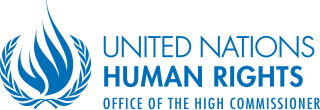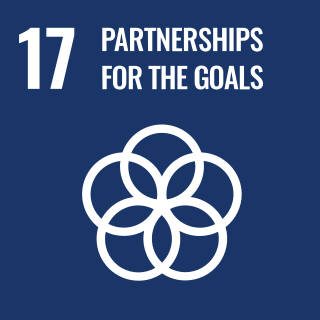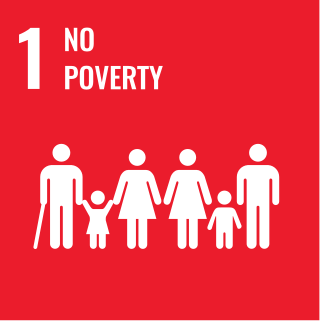
The Office of the United Nations High Commissioner for Human Rights, commonly known as the Office of the High Commissioner for Human Rights (OHCHR) or the United Nations Human Rights Office, is a department of the Secretariat of the United Nations that works to promote and protect human rights that are guaranteed under international law and stipulated in the Universal Declaration of Human Rights of 1948. The office was established by the United Nations General Assembly on 20 December 1993 in the wake of the 1993 World Conference on Human Rights.

The United Nations Industrial Development Organization (UNIDO) is a specialized agency of the United Nations that assists countries in economic and industrial development. It is headquartered at the UN Office in Vienna, Austria, with a permanent presence in over 60 countries. As of April 2019, UNIDO comprises 170 member states, which together set the organization's policies, programs, and principles through the biannual General Conference.
The United Nations Development Programme (UNDP) is a United Nations agency tasked with helping countries eliminate poverty and achieve sustainable economic growth and human development. The UNDP emphasizes developing local capacity towards long-term self-sufficiency and prosperity.

An under-secretary-general of the United Nations (USG) is a senior official within the United Nations System, normally appointed by the General Assembly on the recommendation of the secretary-general for a renewable term of four years. Under-secretary-general is the third highest rank in the United Nations, after the secretary-general and the deputy secretary-general. The rank is held by the heads of different UN entities, certain high officials of the United Nations Secretariat, and high-level envoys. The United Nations regards the rank as equal to that of a cabinet minister of a member state, and under-secretaries-general have diplomatic immunity under the UN Charter.
UN-Energy is an interagency mechanism within the system of the United Nations related to energy. It was created after the 2002 World Summit on Sustainable Development in Johannesburg, and its purpose is to create a coherent approach towards a sustainable energy system especially in developing countries to meet the Millennium Development Goals.

United Nations Water (UN-Water) is an interagency mechanism that coordinates the efforts of United Nations entities and international organizations working on water and sanitation issues.
The United Nations Sustainable Development Group (UNSDG), previously the United Nations Development Group (UNDG), is a consortium of 36 United Nations funds, programmes, specialized agencies, departments and offices that play a role in development. It was created by the Secretary-General of the United Nations in order to improve the effectiveness of United Nations development activities at the country level.

The United Nations Department of Economic and Social Affairs is part of the United Nations Secretariat and is responsible for the follow-up to major United Nations Summits and Conferences, as well as services to the United Nations Economic and Social Council and the Second and Third Committees of the United Nations General Assembly. UN DESA assists countries around the world in agenda-setting and decision-making with the goal of meeting their economic, social and environmental challenges. It supports international cooperation to promote sustainable development for all, having as a foundation the 2030 Agenda for Sustainable Development and the 17 Sustainable Development Goals (SDGs) as adopted by the UN General Assembly on 25 September 2015. In providing a broad range of analytical products, policy advice, and technical assistance, UN DESA effectively translates global commitments in the economic, social and environmental spheres into national policies and actions and continues to play a key role in monitoring progress towards internationally agreed-upon development goals. It is also a member of the United Nations Development Group.
The Committee for the Coordination of Statistical Activities (CCSA) is composed of international and supranational organisations, whose mandate includes the provision of statistics. The CCSA promotes inter-agency coordination and cooperation on statistical programmes and consistency in statistical practices and development. As a forum of committed members, the CCSA fosters good practices in the statistical activities of international and supranational organisations, in accordance with the principles governing international statistical activities. The members of the CCSA contribute actively to the development of a coordinated global statistical system producing and disseminating high-quality statistics.
The United Nations Non-Governmental Liaison Service is a programme of the United Nations mandated to promote and develop constructive relations between the United Nations and civil society organizations. UN-NGLS operates autonomously across the United Nations system and with civil society constituencies and social movements on cross-cutting and emerging issues on the UN agenda. For example, UN-NGLS currently focuses on the UN General Assembly preparatory process for negotiations of a global compact on migration, and high-level events organized by the President of the UN General Assembly. UN-NGLS advises civil society organizations on opportunities to engage with the UN and facilitates their participation in various UN processes and events. UN-NGLS has offices at UN headquarters in New York and is part of the United Nations Department of Global Communications.

The Sustainable Development Goals or Global Goals are a collection of seventeen interlinked objectives designed to serve as a "shared blueprint for peace and prosperity for people and the planet, now and into the future". The SDGs are no poverty; zero hunger; good health and well-being; quality education; gender equality; clean water and sanitation; affordable and clean energy; decent work and economic growth; industry, innovation and infrastructure; reduced inequalities; sustainable cities and communities; responsible consumption and production; climate action; life below water; life on land; peace, justice, and strong institutions; and partnerships for the goals. The SDGs emphasize the interconnected environmental, social and economic aspects of sustainable development by putting sustainability at their center.

The Millennium Development Goals Achievement Fund (MDG-F) was an international cooperation mechanism committed to eradicating poverty and inequality and to accelerating progress towards the Millennium Development Goals (MDGs) worldwide. Its aim was to improve livelihoods and to influence public policy, which made it responsive to the needs of the poorest populations.

The Secretary-General's Envoy on Youth serves as a global advocate for addressing the needs and rights of young people for bringing the United Nations closer to them. The Envoy's Office is part of the United Nations Secretariat and supports multi-stakeholder partnerships related to the United Nations system-wide action plan on youth to volunteer initiatives. The office also promotes the empowerment and foster the leadership of youth at the national, regional, and global levels, including through exploring and encourages mechanisms for young people’s participation in the work of the United Nations and in political and economic processes with a special focus on the most marginalized and vulnerable youth.
Monitoring and Evaluation (M&E) is a combined term for the processes set up by organizations such as companies, government agencies, international organisations and NGOs, with the goal of improving their management of outputs, outcomes and impact. Monitoring includes the continuous assessment of programmes based on early detailed information on the progress or delay of the ongoing assessed activities. Evaluation involves the examination of the relevance, effectiveness, efficiency and impact of activities in the light of specified objectives.
Global Environmental Governance is the title of a book written by Adil Najam, Mihaela Papa and Nadaa Taiyab. All the information of this article comes from this book.
The United Nations Interagency Task Force on the Prevention and Control of Non-communicable Diseases (UNIATF), hereafter referred to as the Task Force, was established by the United Nations Secretary-General in 2013. Non-communicable diseases (NCDs), also known as chronic diseases, include cardiovascular diseases, cancers, chronic respiratory diseases and diabetes. The role of the Task Force is to bring relevant actors from across the United Nations (UN) system and national governments together to develop whole-of-government, whole-of-society approaches for the prevention and control of NCDs. Following the establishment of the 2030 Agenda for Sustainable Development in 2015, the Task Force's scope of work was expanded to include “NCD related Sustainable Development Goals (SDGs)” such as addressing mental health conditions, violence, injuries, nutrition and environmental issues that contribute to the global burden of NCDs. The Task Force promotes multisectoral action for the prevention and control of NCDs, supports countries to achieve the Sustainable Development Goals (SDGs) and supports countries to move towards Universal Health Coverage (UHC). The work of the Task Force includes implementing the Global Joint Programme to conduct investment cases, coordinating interagency joint programmes and facilitating thematic working groups. The World Health Organization acts as a Secretariat for the Task Force.
Azerbaijan has been a member in the United Nations since March 2, 1992, after the UN General Assembly admitted Azerbaijan at its 46th session. The Permanent Mission of the Republic of Azerbaijan was opened in New York City in May 1992. On October 29, 1991, soon after gaining independence from the Soviet Union, Azerbaijan applied to the UN General Assembly for joining the organization. Azerbaijan was elected as a non-permanent member of the UN Security Council for the term of 2012–2013. Through the UN, Azerbaijan has reached out to the international community, especially Europe. Azerbaijan strengthened its relations with the UN by cooperating with UN agencies and bodies such as International Monetary Fund, the World Bank, the World Food Programme, and the financial institutions of the UN.

Sustainable Development Goal 16 is one of the 17 Sustainable Development Goals established by the United Nations in 2015, the official wording is: "Promote peaceful and inclusive societies for sustainable development, provide access to justice for all and build effective, accountable and inclusive institutions at all levels". The Goal has 12 targets and 23 indicators.

Sustainable Development Goal 17 is about "partnerships for the goals." One of the 17 Sustainable Development Goals established by the United Nations in 2015, the official wording is: "Strengthen the means of implementation and revitalize the global partnership for sustainable development". SDG 17 refers to the need for the nonhegemonic and fair cross sector and cross country collaborations in pursuit of all the goals by the year 2030. It is a call for countries to align policies.

Sustainable Development Goal 1, one of the 17 Sustainable Development Goals established by the United Nations in 2015, calls for the end of poverty in all forms. The official wording is: "No Poverty". Member countries have pledged to "Leave No One Behind": underlying the goal is a "powerful commitment to leave no one behind and to reach those farthest behind first". SDG 1 aims to eradicate every form of extreme poverty including the lack of food, clean drinking water, and sanitation. Achieving this goal includes finding solutions to new threats caused by climate change and conflict. SDG 1 focuses not just on people living in poverty, but also on the services people rely on and social policy that either promotes or prevents poverty.







